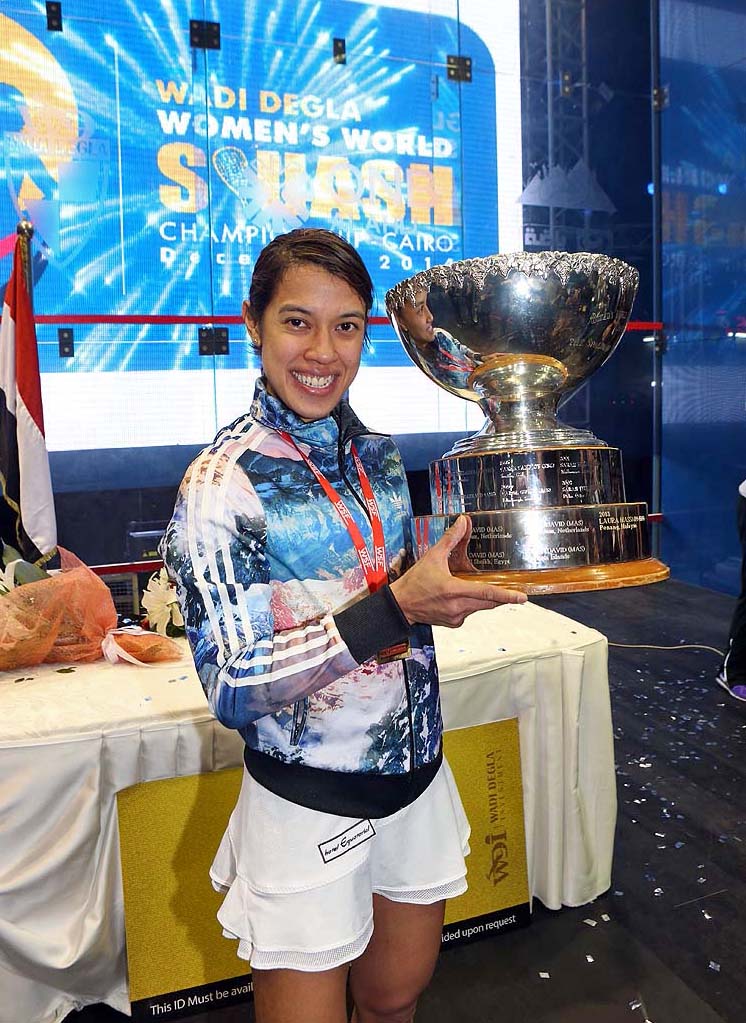One little incident during Nicol David’s unforgettable recapture of the world title in Cairo was so prematurely revealing that it may pass into sporting folklore.
The most successful player in the history of the game was trailing by two games to one against the gifted home hope Raneem El Welily, amidst a wave of feeling in which years of national pain seemed about to receive the therapy of a unique success by an Egyptian woman.
So therapeutic was it in fact that the World Championship trophy was moved enthusiastically into position for presentation to the winner at the end of the fourth game.
Whether David saw this or not, is unclear—she was too diplomatic to say—but 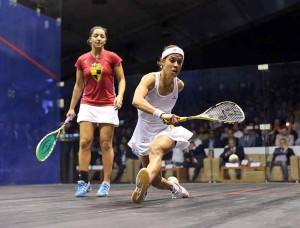 possibly she did. What is certain is that she felt the emotional electricity being generated to a level in that it was becoming the most powerful combination of spectators and opponent she had ever faced.
possibly she did. What is certain is that she felt the emotional electricity being generated to a level in that it was becoming the most powerful combination of spectators and opponent she had ever faced.
Soon the 100-month world number one was slipping to a 6-10 deficit, facing four successive match balls before a baying, bellowing crowd, and apparently beaten. Moving the trophy seemed to have been self-fulfilling.
Then a miracle happened. Grittily, flintily, and eventually brilliantly, David made her improbable escape. Not only was it done with typical patience and focus but, in her darkest hour, with a bright new creativity. Time-forged mental strength was allied to newly implemented skills, and together they were irresistible.
David enjoyed a little luck too. This heady mixture made it probably the best and most dramatic women’s world final of all. Some who saw it may claim it as the greatest women’s squash match ever.
And so premature Egyptian hopes were dashed. Despite this, let there be no 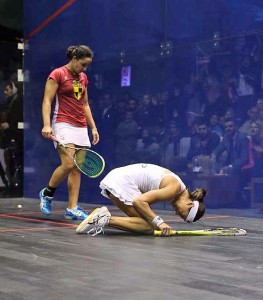 mistake about Egypt’s amazing contribution to a remarkable World Championship, put together with love and knowledge by Karim Darwish, the former world number one, and a super-motivated team, located in the most luxuriously modern Wadi Degla club, and fashioned at a time of enormous significance for the sport.
mistake about Egypt’s amazing contribution to a remarkable World Championship, put together with love and knowledge by Karim Darwish, the former world number one, and a super-motivated team, located in the most luxuriously modern Wadi Degla club, and fashioned at a time of enormous significance for the sport.
Its success helped justify the women’s contribution to the imminent merger of their tour with the men’s, and sent a worldwide message that squash’s newly revived hopes of getting into the Olympics were well-founded. This was a World Championship created under the twin pressures of time and spotlight.
So its heart-thumping conclusion between two wonderfully contrasting players was both a blessing and a justice. Its four saved match points and their pulsating aftermath will always remain in the memories of those who witnessed them.
The first was saved by a David forehand drive that was whipped across court with enough speed to hurry Welily’s cut-off volley downwards into the tin. The second produced a long, maneuvering rally that was finished by David with a stunningly accurate forehand volley into the nick.
This launched an adrenaline-rushing realization that the final might be far from over. That may have forced Welily’s error on the next point, a volleyed service return which smacked melodramatically into the tin when one true blow might have won the match.
One match ball left. This time Welily was reluctant to force the issue and there followed a long, characteristically maneuvering rally from David. But although the conclusion was similar, with Welily again volleying edgily into the tin, everything else changed. Emotions shifted. Fear passed from the Malaysian to the Egyptian. The crowd now howled a different, more anxious kind of noise.
To her credit Welily bravely saved two game balls, but by then the contest was shifting tactically as well as emotionally. That was because David was attempting initiatives she had not consistently shown in big moments.
She reached 11-10 with a delicious front court sidewall trickle, went 12-11 ahead 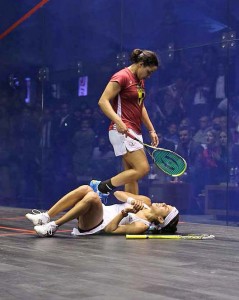 with a neat little forehand drop, and got to two games all with an intercepting overhead winner. It was deft and courageous stroke play of a high order.
with a neat little forehand drop, and got to two games all with an intercepting overhead winner. It was deft and courageous stroke play of a high order.
The fifth game was quite different. After Welily mistimed a drive and conceded a penalty stroke that allowed David to regain the serve at 3-3, the match ran inexorably away from the Egyptian.
That happened as David continued to make spectacular progress in the front court. The backhand drop that carried her to 7-4 and the backhand boast that took her to 8-4 were daring initiatives, suggesting confidence in her technical progress. She had shown great mental strength to come back. Now she was showing other, much newer strengths.
David later disagreed that these had involved risks, though she acknowledged a change in tactical emphasis during the most crucial phases of the match. “There were moments when I thought it could be over, but I didn’t want it to end that way,” she said.
“I knew that if I didn’t do something about it she would take it. I wanted to make it happen, so, yes there was a change of emphasis in the way I played.
“It was quite difficult to do that, when Raneem was going for broke. She gives you less time to play. But I had to take time away from her too and found a way to do that.”
The match plunged to a finish amidst a sea of emotions. Most of them were very different from those anticipated half an hour earlier. David found some theater in her soul, throwing herself to the floor, before tearfully struggling towards the support of a side wall, sobbing in a way she has rarely done.
A few minutes later, during her thank you speech, she choked up again, though the words were immaculately chosen. Later she volunteered: “It was the most memorable match of my entire career.”
Given the uniquely dramatic context this was arguably more thrilling even than the world final in 1996 in which Sarah Fitz-Gerald saved seven match points in the tightest of finishes against Michelle Martin, but in the more neutral ambience of a Stuttgart crowd.
David’s comeback also extended her record of world titles to eight and made her the first player to lose and win the world title in one calendar year. But it was the manner of its achievement that suggested that she might be moving from consistent excellence towards greatness.
Most of it could not have been so memorable without Welily’s special qualities. Her exhilarating touch and intriguing disguises took her to within two or three inches of becoming the first Egyptian woman to win the world title, and her attitude never failed her.
“There will be lots of positives to take from my performance—I just won’t be taking them today, that’s all,” she said. “I needed to do something about what happened—and I didn’t. I can perhaps become champion in the future. But I will need to learn a lot.”
Her response revealed grace and courage and a deep well of personal qualities—fortunately, because unlucky Welily’s burden may now be specially heavy. She may never be offered another chance of glory quite like this.
However, she wasn’t the only Egyptian trying to put behind her the thoughts of what might have been. The previous day Omneya Abdel Kawy also led David by two games to one in the semifinals before the Malaysian came back to win 11-9, 9-11, 8-11, 11-5, 11-5.
Kawy, limited in mobility but unequalled in racquet skills, was playing even better than four years previously in Sharm El-Sheikh when she became the first Egyptian woman to reach a world final. This time in the quarterfinals she eliminated Low Wee Wern, the seventh seed and a heroine of Malaysia’s first progress into a world team final less than a fortnight before at Niagara Falls.
And so Kawy provided David with a valuable rehearsal in how to survive. Another burst of ambushes from Kawy’s eye-pleasing stroke-play at 4-5 in the final game might have ended it all.
Instead David responded. “I tried to put more purpose into my shots; then she was attempting a few things which were out of reach,” David said, meaning that Kawy had been forced to take too many risks. “I found an ability to bring my level up, which was not easy.”
That was also what David did in the crisis against Welily, and, reportedly, also in two of her performances at Niagara. On each occasion there emerged a slightly different, evolving David, one who was able to carve out a route with a deceptive racket as well as with relentless movement.
It was as if all David’s earlier matches had been preparations for her greatest day. In the first round she had had to rescue a first game amidst some loud calls to prayer from a muezzin and some talented ball striking from Yathreb Adel before winning 11-9, 11-6, 11-3 against the Egyptian teenager; then in the second round recover from 7-9 in the first game and 8-9 in the second during a 12-10, 11-9, 11-1 win over Emily Whitlock, a young English qualifier; then in the quarterfinals save three successive game points in a high intensity third game against Camille Serme, the sixth-seeded French player, in a 11-9, 11-7, 13-11 success.
Throughout, David was getting quality court time while suffering relatively little 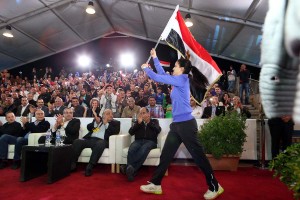 diminution in physical resources. Without all that the cliff-hanger in Cairo might never have come about.
diminution in physical resources. Without all that the cliff-hanger in Cairo might never have come about.
It was David’s second recoup of a major title in seven months. Back in May, at the British Open in Kingston-upon-Hull, she had won an excellent final against Laura Massaro, the English woman who had succeeded her as British Open champion.
Massaro also succeeded David as world champion, but now her defense went no further than the quarterfinals. There she was beaten in four games by a confidently attacking Alison Waters, an England colleague who had been drawing strength from winning the decider in the world team final, and who came back resiliently from 7-9 down in the fourth game.
Massaro’s belief was that surviving her “Penang panic”—an entire day before the 2013 World Championship final in which she felt “worse than I have ever felt before”—had helped her become emotionally stronger. That may still prove so. But here she was a little flat, perhaps the aftermath of illness from which she had been struggling to recover at Niagara.
Waters was excellent, but not quite good enough to get past a buoyant Welily the following day. It proved an uplifting tournament for most of the Egyptians—with the notable exception of the nineteen-year-old Nour El Sherbini.
Although Sherbini had come within two points of the world title nine months  before, now she was neither assertive nor nimble enough on a cool court to survive against her light-footed seventeen-year-old compatriot Nouran Gohar, and lost 11-6, 12-10, 4-11, 13-11.
before, now she was neither assertive nor nimble enough on a cool court to survive against her light-footed seventeen-year-old compatriot Nouran Gohar, and lost 11-6, 12-10, 4-11, 13-11.
Will either or both of these teenagers be contending for Egypt’s first gold medal in more than seventy years at the Tokyo Olympics in 2020? Quite possibly.
So too might David be competing for Malaysia’s first Olympic gold medal of any kind, though by then she will be thirty-six. She began the week by asserting that squash’s chances of getting into the Olympics were now significantly stronger after an extraordinary IOC meeting in Monte Carlo in December—where the cap on the number of sports in the Games had been replaced by a cap on the number of athletes.
That gave these unusual World Championships an extra tinge of excitement, for the implication was that its top player might delay retirement to chisel out an ideal conclusion to a uniquely successful career. David nevertheless tempered this surge in optimism by saying that the best chance of achieving squash’s historic goal would only happen by progressing step by step.
“If creating a cap for the number of athletes makes it open to new sports, then it’s a great step,” she said, “It’s exciting times to make these changes, and a positive step for future Olympics.”
Then she warned: “Of course we mustn’t get ahead of ourselves. I am sure there is an opportunity that squash will have this time—but we will have to wait and see what the IOC want to do.
“Squash’s chances depend on whether some existing Olympic sports can be encouraged to reduce their numbers of athletes, or even forego an event—and it’s difficult for the IOC to take that step,” she pointed out. “Which sport would have to reduce? Some sports have been in the Olympics for a long time.
“It is tough for a sport to reduce its events. It takes a bit of time and effort, and a desire from IOC. But we will hope they will look for that.”
It became evident that, even while battling for another world title, helping squash to make it into the Olympics was David’s greatest remaining ambition. Her emotions were too intense to hide.
“I will only be content once I see squash and the Olympics next to each other on a piece of paper, being signed!” she said, the words tumbling passionately out. “And then I will be satisfied.”


